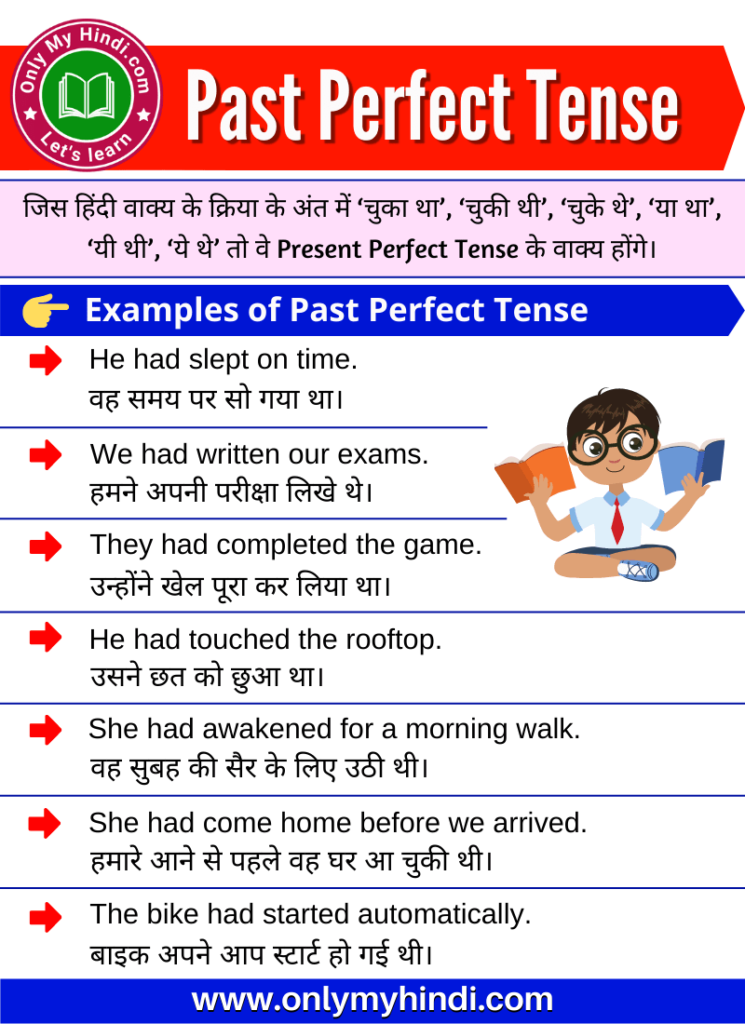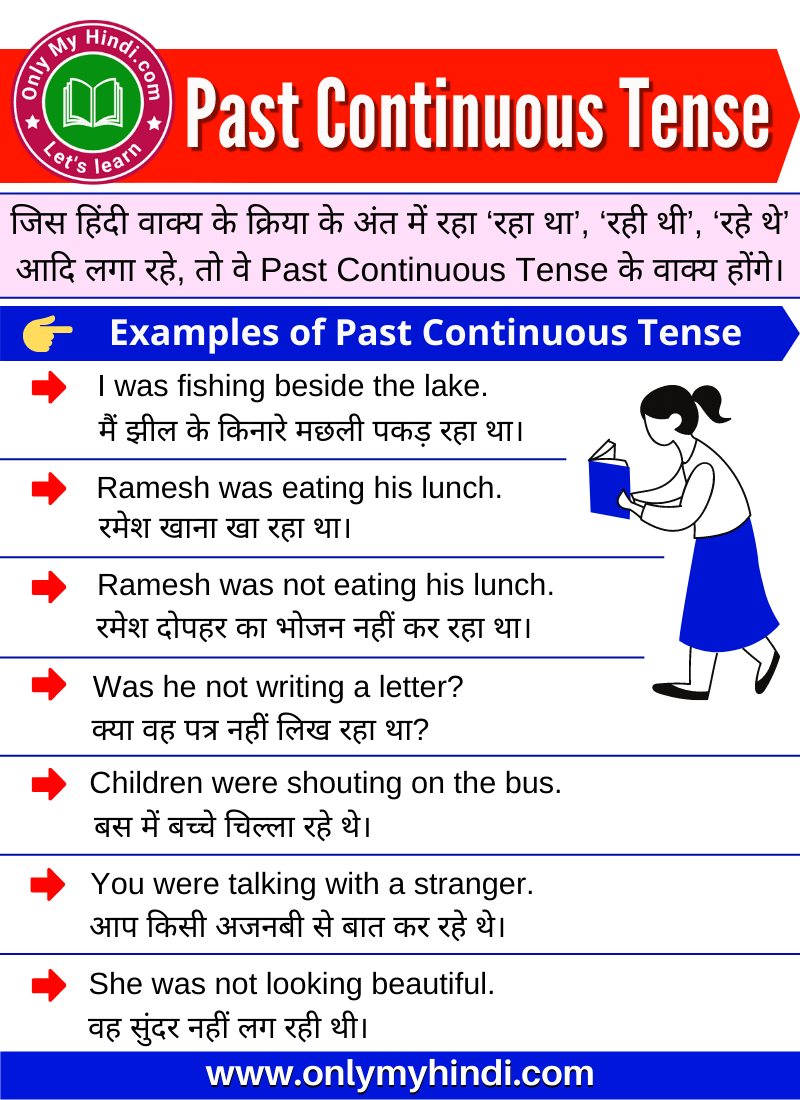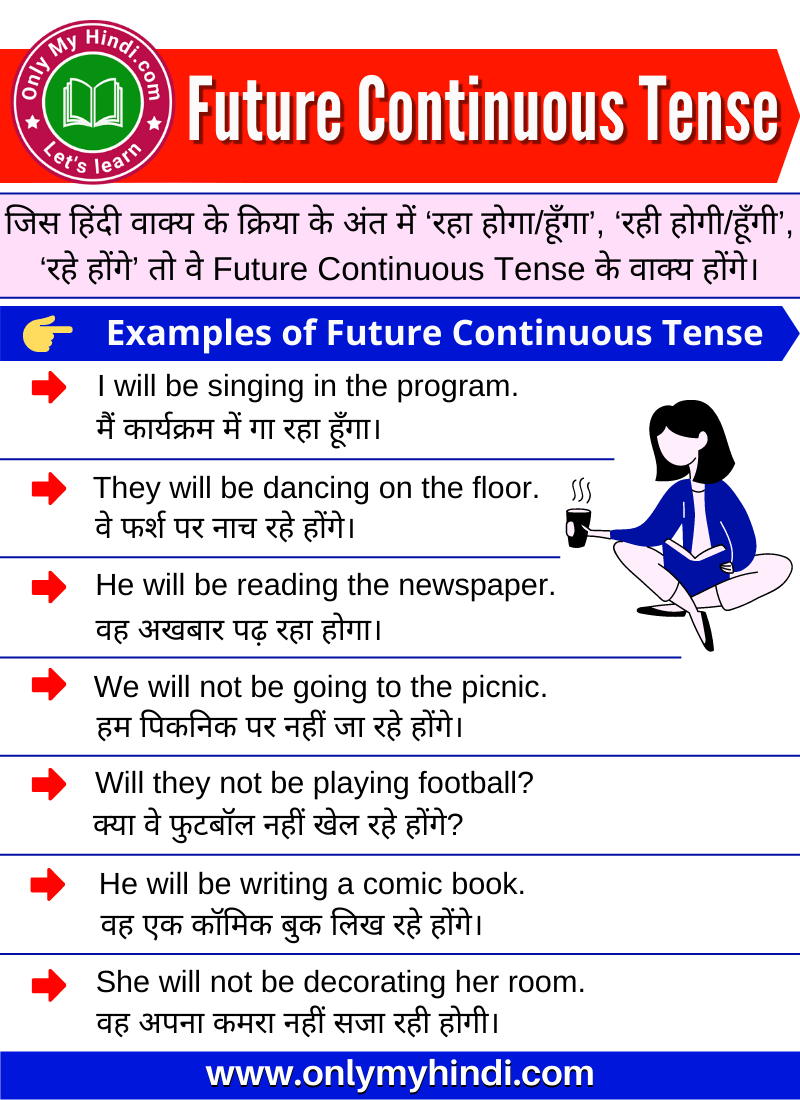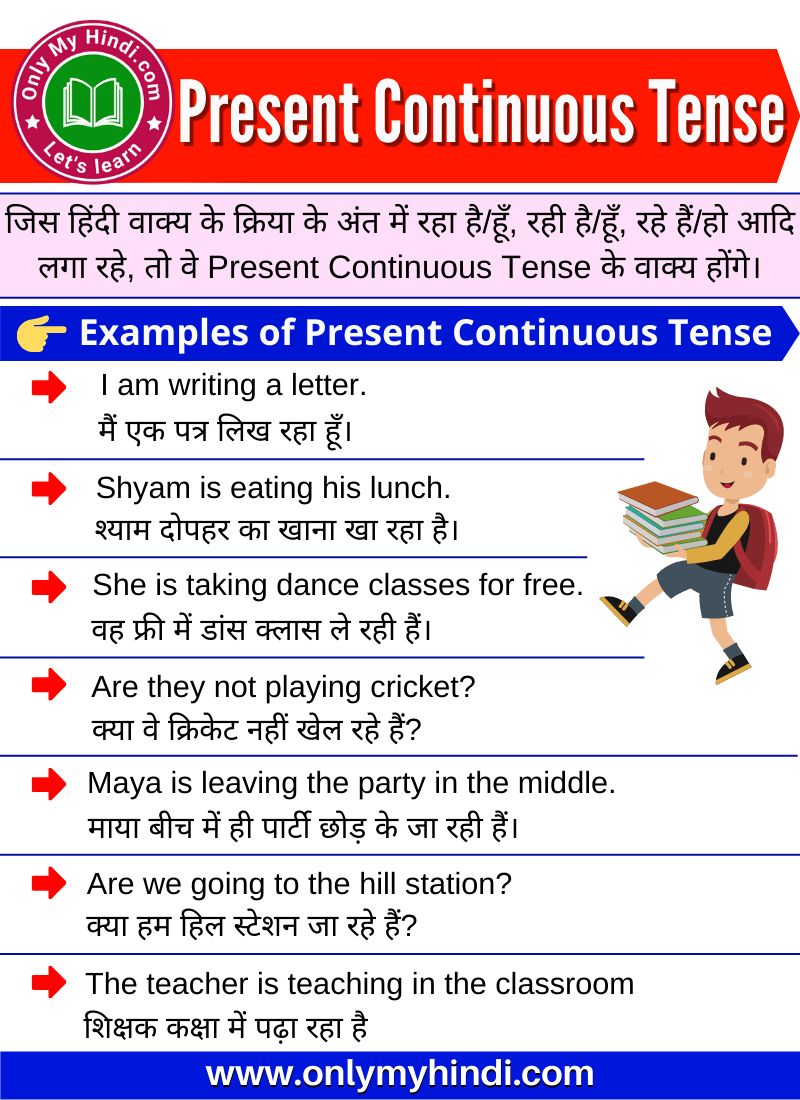क्या आप ढूंढ रहे हैं Past Perfect Tense in Hindi with Rules, Exercise and Examples? यहां पर हमने आपको सरल भाषा में समझाया है की, Past Perfect क्या होता है, और हम इसे किस तरह से इस्तेमाल कर सकते है।
Past Perfect Tense in Hindi
‘Past Perfect Tense’ को हम हिंदी में ‘पूर्ण भूत काल’ कहते हैं। इस Tense में उपयोग होने वाले वाक्यों से हम यह पता कर सकते हैं की भूत काल में कार्य पूर्ण हो चुके है। यह tense उस घटना का वर्णन करता हैं जो कार्य भूत काल में समय से पहले ही पूर्ण हो चूका हैं।
Past Perfect Tense की पहचान
‘Past Perfect Tense’ को हम किस तरह पहचान सकते हैं?
हिंदी वाक्यों के अंत मे ‘चुका था’, ‘चुकी थी’, ‘चुके थे’, ‘या था’, ‘यी थी’, ‘ये थे’ आदि शब्द आते हैं तो उन वाक्यों को हम Past Perfect Tense Sentence (पूर्ण भूत काल के वाक्य) कहते हैं।
Past Perfect Tense के अंग्रेजी वाक्यों में helping verb ‘had’ का उपयोग होता है और इस tense वाले वाक्यों में जो verb का प्रयोग होता है वह verb का third form होता है जो कार्य के पूर्णता को दर्शाता हैं।
Formula: Subject + had + verb (ed / third form) + Object.

Past Perfect Tense Examples in Hindi
- He had slept on time.
वह समय पर सो गया था।
- She had awakened for a morning walk.
वह सुबह की सैर के लिए उठी थी।
- We had written our exams.
हमने अपनी परीक्षा लिखे थे।
- They had completed the game.
उन्होंने खेल पूरा कर लिया था।
- He had touched the rooftop.
उसने छत को छुआ था।
Past Perfect Tense के दो clause वाले वाक्य
Past Perfect Tense में कुछ वाक्य ऐसे भी होते हैं जिनमे पूर्ण भूत काल और सामान्य भूत काल दोनों का समावेश होता है। इस tense में जब हम वाक्यों का प्रयोग करते हैं तब दोनों वाक्य भूतकाल में ही समाप्त होते है।
- अगर sentence में before ‘पहले’ जैसे शब्दों का प्रयोग हो, तब हम पूर्ण भूत काल के खंड का वाक्य पहले लिखते हैं उसके बाद ‘before’ शब्द लगा कर बाद वाला वाक्य सामान्य भूत काल में लिखते है।
- अगर sentence में after ‘पश्चात’, ‘उसके बाद’ जैसे शब्दों का प्रयोग हो तब हम सामान्य भूत काल के खंड का वाक्य पहले लिखते हैं उसके बाद ‘after’ लग के बाद वाला वाक्य पूर्ण भूत काल में लिखते है।
Examples,
- She had come home before we arrived.
हमारे आने से पहले वह घर आ चुकी थी।
- Jatin danced after the anchor had announced the name of Jatin.
एंकर द्वारा जतिन के नाम की घोषणा करने के बाद जतिन ने डांस किया।
- She had rocked on the stage before we came there.
हमारे वहां आने से पहले उन्होंने स्टेज पर धमाल मचा दिया था।
- My mother cooked food after the children had come home from the playground.
बच्चों के खेल के मैदान से घर आने के बाद मेरी माँ ने खाना बनाया।
- She didn’t agreed to come after I had refused her proposal.
मेरे द्वारा उसके प्रस्ताव को ठुकराने के बाद वह आने के लिए तैयार नहीं हुई।
Types of Past Perfect Tense in Hindi
Past Perfect Tense के वाक्यों के कुल तीन प्रकार होते हैं।
- Affirmative sentence (सकारात्मक वाक्य)
- Negative sentence (नकारात्मक वाक्य)
- Interrogative sentence (प्रश्नवाचक वाक्य)
Affirmative Sentence
‘Affirmative Sentence’ of Past Perfect tense पूर्ण भूत काल के सामान्य सकारात्मक वाक्य है जो किसी हो रहे कार्य के सकारात्मक तरीके से पूर्ण होने का संदेश देते हैं।
Affirmative sentence की रचना:
Formula: Subject + had + verb (ed / third form) + Object.
Examples,
- The bike had started automatically.
बाइक अपने आप स्टार्ट हो गई थी।
- She had gone to the Boutique.
वह बुटीक गई थी।
- Raman had eaten all the fruits.
रमन सारे फल खा चुका था।
- We had discussed this matter.
हमने इस मामले पर चर्चा की थी।
- The foreigners had visited TajMahal.
विदेशियों ने ताजमहल का दौरा किया था।
Negative Sentence
‘Negative Sentence’ of Past Perfect tense पूर्ण भूत काल के सामान्य नकारात्मक वाक्य है जो किसी पूर्ण हुए कार्य को नकारात्मक तरीके से दर्शाते हैं।
इन वाक्यों में जो helping verb है उनके साथ not का इस्तेमाल होता है जो नकारात्मकता को दर्शाता हैं।
Negative sentence की रचना:
Formula: Subject + had + not + verb (ed / third form) + Object.
Examples,
- The bike had not started automatically.
बाइक अपने आप स्टार्ट नहीं हुई थी।
- She had not gone to the Boutique.
वह बुटीक नहीं गई थी।
- Raman had not eaten all the fruits.
रमन ने सारे फल नहीं खाए थे।
- We had not discussed this matter.
हमने इस मामले पर चर्चा नहीं किये थे।
- The foreigners had not visited TajMahal.
विदेशियों ने ताजमहल का दौरा नहीं किया था।
Interrogative Sentence
‘Interrogative Sentence’ of Past Perfect tense पूर्ण भूत काल के सामान्य प्रश्नात्मक वाक्य है जो किसी पूर्ण हुए कार्य को प्रश्नात्मक तरीके से पूछे जात हैं।
प्रश्नात्मक वाक्य helping verbs से शुरू होता है और अंत में Question mark से ख़त्म होता है जो प्रश्नात्मकता को दर्शाता है।
Interrogative sentence की रचना:
Formula: Had + Subject + verb (ed / third form) + object + ?
Wh word + had + Subject + verb (ed / third form) + object + ?
Had + Subject + not + verb (ed / third form) + object + ?
Wh word + had + Subject + not + verb (ed / third form) + object + ?
Examples,
- Had the bike started automatically?
क्या बाइक अपने आप स्टार्ट हो गई थी?
- Had she gone to the Boutique?
क्या वह बुटीक गई थी?
- Had Raman eaten all the fruits?
क्या रमन ने सारे फल खा लिए थे?
- Where had we discussed this matter?
हमने इस मामले पर कहां चर्चा की थी?
- Why had they visited TajMahal?
वे ताजमहल क्यों गए थे?
- Had the bike not started automatically?
क्या बाइक अपने आप स्टार्ट नहीं हुई थी?
- Had she not gone to the Boutique?
क्या वह बुटीक नहीं गई थी?
- Had Raman not eaten all the fruits?
क्या रमन ने सारे फल नहीं खाए थे?
- Where had we not discussed this matter?
हमने इस मामले पर कहाँ चर्चा नहीं की थी?
- Why had they not visited TajMahal?
वे ताजमहल क्यों नहीं गए थे?
Past Perfect Tense के Examples,
For Affirmative sentences,
- The farmer had sowed the seeds in the farmland.
किसान ने खेत में बीज बोया था।
- He had come to meet his aunt.
वह अपनी मौसी से मिलने आया था।
- The book had placed on the table.
किताब टेबल पर रखी थी।
- I had worked on my project.
मैंने अपने प्रोजेक्ट पर काम किया था।
- They had qualified for the scholarships.
उन्होंने छात्रवृत्ति के लिए योग्यता प्राप्त की थी।
- The Indian team had won the World cup title.
भारतीय टीम ने वर्ल्ड कप का खिताब अपने नाम किया था।
- John Cena had beaten his opponent wrestler.
जॉन सीना ने अपने प्रतिद्वंदी पहलवान को मात दी थी।
- The Government had forgotten their promises.
सरकार अपने वादों को भूल चुकी थी।
- Suraj had cried for his defeat.
सूरज अपनी हार के लिए रोया था।
- The teacher had taken the surprise tests.
शिक्षिका ने सरप्राइज टेस्ट लिया था।
For Negative sentences,
- The farmer had not sowed the seeds in the farmland.
किसान ने खेत में बीज नहीं बोया था।
- He hadn’t come to meet his aunt.
वह अपनी मौसी से मिलने नहीं आया था।
- The book had not placed on the table.
किताब मेज पर नहीं रखी थी।
- I had not worked on my project.
मैंने अपने प्रोजेक्ट पर काम नहीं किया था।
- They hadn’t qualified for the scholarships.
वे छात्रवृत्ति के लिए योग्य नहीं थे।
- The Srilankan team hadn’t won the World Cup title.
श्रीलंकाई टीम वर्ल्ड कप का खिताब नहीं जीत पाई थी।
- John Cena hadn’t beaten his opponent wrestler.
John Cena ने अपने प्रतिद्वंद्वी पहलवान को नहीं हराया था।
- The Government had not remembered their promises.
सरकार को अपने वादे याद नहीं थे।
- Suraj hadn’t cried for his defeat.
सूरज अपनी हार के लिए नहीं रोया था।
- The teacher had not taken the surprise tests.
शिक्षक ने आश्चर्य परीक्षण नहीं लिया था।
For Interrogative sentences,
- (Interrogative Affirmative sentences)
- Had the farmer sowed the seeds in the farmland?
क्या किसान ने खेत में बीज बोया था?
- Had he come to meet his aunt?
क्या वह अपनी मौसी से मिलने आया था?
- Had the book placed on the table?
क्या किताब मेज पर रखी थी?
- Had I worked on my project?
क्या मैंने अपने प्रोजेक्ट पर काम किया था?
- Had they qualified for the scholarships?
क्या वे छात्रवृत्ति के लिए योग्य थे?
- Had the Indian team won the World cup title?
क्या भारतीय टीम ने विश्व कप का खिताब जीता था?
- When had John Cena beaten his opponent wrestler?
जॉन सीना ने अपने प्रतिद्वंद्वी पहलवान को कब हराया था?
- Why had the Government forgotten their promises?
सरकार अपने वादों को क्यों भूल गई?
- Why had Suraj cried for his defeat?
सूरज अपनी हार के लिए क्यों रोया था?
- When had the teacher taken the surprise tests?
शिक्षक ने आश्चर्य परीक्षण कब लिया था?
- (Interrogative Negative sentences)
- Had the farmer not sowed the seeds in the farmland?
क्या किसान ने खेत में बीज नहीं बोया था?
- Had he not come to meet his aunt?
क्या वह अपनी मौसी से मिलने नहीं आया था?
- Had the book not placed on the table?
क्या किताब मेज पर नहीं रखी थी?
- Had I not worked on my project?
क्या मैंने अपने प्रोजेक्ट पर काम नहीं किया था?
- Had they not qualified for the scholarships?
क्या वे छात्रवृत्ति के लिए योग्य नहीं थे?
- Had the Indian team not won the World cup title?
क्या भारतीय टीम ने वर्ल्ड कप का खिताब नहीं जीता था?
- When had John Cena not beaten his opponent wrestler?
जॉन सीना ने अपने प्रतिद्वंद्वी पहलवान को कब नहीं पीटा था?
- Why had the Government not forgotten its promises?
सरकार अपने वादों को क्यों नहीं भूली?
- Why had Suraj not cried for his defeat?
सूरज अपनी हार के लिए क्यों नहीं रोया था?
- When had the teacher not taken the surprise tests?
शिक्षक ने सरप्राइज टेस्ट कब नहीं लिया था?
Past Perfect Tense Exercise in Hindi
- She _________ to visit the village. (come)
- They _________ for the tournament. (not qualify)
- ____he _____ all his debts with interest? (clear)
- Where ____ we ____ the giant snake? (see)
- Why ____ the farmer _______ the crops before the rain came? (not cut)
- He _________ with his class teacher. (talk)
- We _______ to that nonsense deal. (agree)
- She _________ her promise. (forget)
- Why ___ he ______ at me? (not look)
- Where ___ you _____ yesterday? (go)
Answers:
- She had come to visit the village.
- They had not qualified for the tournament.
- Had he cleared all his debts with interest?
- Where had we seen the giant snake?
- Why had not the farmer cut the crops before the rain came?
- He had talked with his class teacher.
- We had not agreed to that nonsense deal.
- She had forgotten her promise.
- Why had he not looked at me?
- Where had you gone yesterday?
More Tenses


